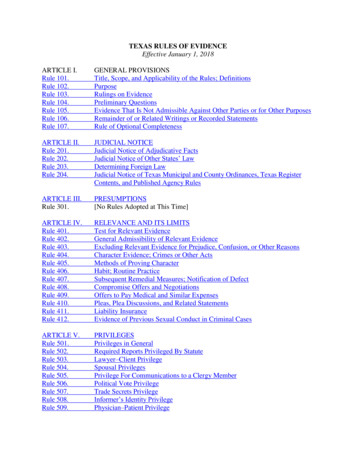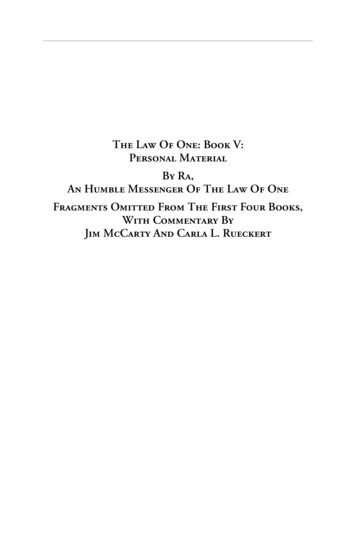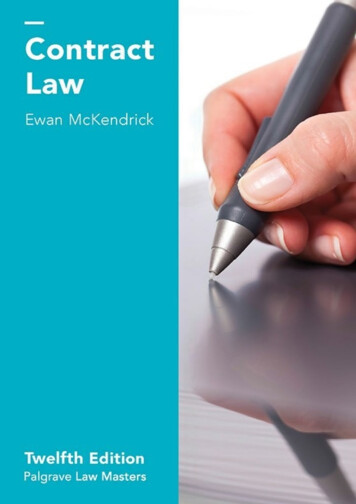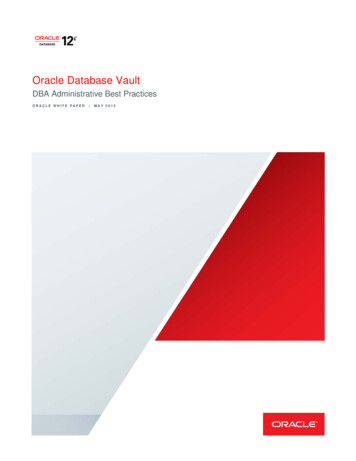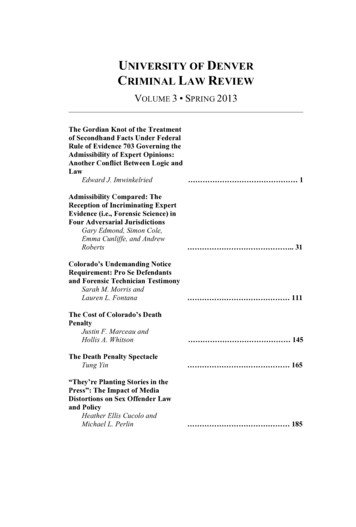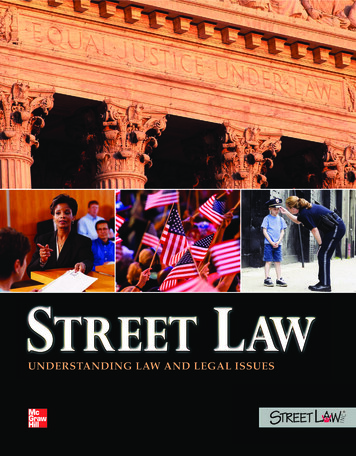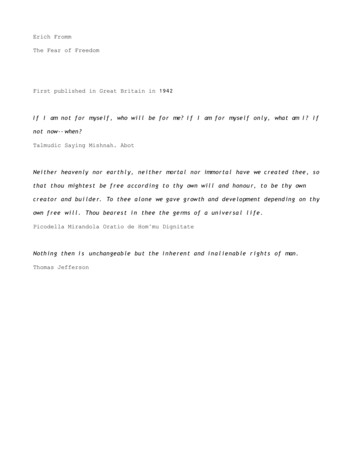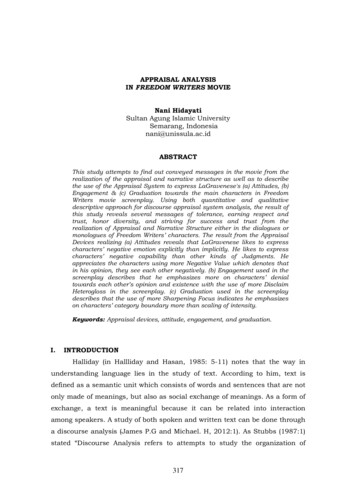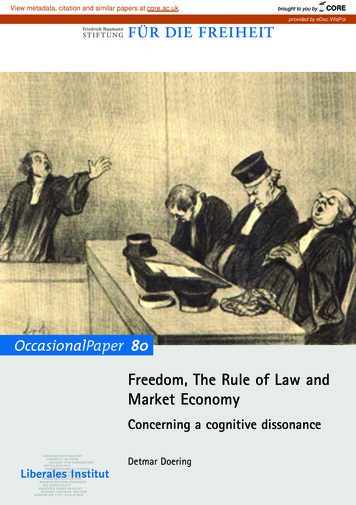
Transcription
View metadata, citation and similar papers at core.ac.ukbrought to you byCOREprovided by eDoc.VifaPolOccasionalPaper 80Freedom, The Rule of Law andMarket EconomyConcerning a cognitive dissonanceDetmar Doering
If you wish to support our work:Commerzbank BerlinBIC 100 400 00Donations account: 266 9661 04Donation receipts will be issued.Imprint:Published by the Liberal InstituteFriedrich-Naumann-Stiftung für die FreiheitKarl-Marx-Straße 2D-14482 PotsdamPhone 49 3 31.70 19-2 10Fax 49 3 31.70 19-2 16libinst@freiheit.orgwww.freiheit.orgTitelbild: Lithografie von Honoré Daumier „Die Juristen“ Q8VZq0h6QCOMDOK GmbHOffice BerlinFirst Edition 2011
Freedom, The Rule of Law andMarket EconomyConcerning a cognitive dissonanceDetmar DoeringLiberales InstitutFriedrich-Naumann-Stiftung für die Freiheit
The AuthorDr. Detmar Doering, b. 1957 in Remscheid-Lennep (Germany), is Director ofthe Liberales Institut (Liberty Institute) of the Friedrich-Naumann-Foundationin Potsdam, Germany.He has studied philosophy and history at Cologne University (Ph.D. in PoliticalPhilosophy in 1990) and University College London.He has published several books. Among them are:Kräfte des Wandels? (with Lieselotte Stockhausen-Doering)(1990)Die Wiederkehr der Klugheit: Edmund Burke und das Augustan Age)(1990)Kleines Lesebuch über den Liberalismus (ed., translated into 18 languages/English translation: Readings in Liberalism, published by the Adam Smith Institute)(1992)Liberalismus: Ein Versuch über Freiheit (1993)Freiheit: Die unbequeme Idee (ed. with Fritz Fliszar)(1995)Frédéric Bastiat: Denker der Freiheit (1997)Friedlicher Austritt. Braucht die Europäische Union ein Sezessionsrecht? (2002)Kleines Lesebuch über den Freihandel (ed., 2003)Vernunft und Leidenschaft. Ein David-Hume-Brevier (ed., 2003)The Political Economy of Secession (ed., with Jürgen Backhaus) (2004)Kleines Lesebuch über den Föderalismus (2005)Globalisation: Can the free market work in Africa? (2007)Kleines Lesebuch über Frauenrechte (2007)Traktat über Freiheit (2009)He also published numerous articles in German and international academicjournals and daily newspapers on economic, political and historical subjects.Member of the Mont Pelerin Society since 1996.Dr. Doering lives in Berlin. He is married and father of a 15 year-old daughter.
ContentsI.Cognitive dissonance or contradiction?5II.Explanation of terms6III. The basic premise: a little philosophy.7IV. Economic freedom: empirical measurement8V.Right to property: what the rule of law and market economieshave in common.12VI. Economic freedom, freedom and human rights15VII. The rule of law and civil rights19VIII. Authoritarian transformation: is less freedom more freedom?21IX. Economic freedom as the origin of rule of law?23X.26Does the rule of law need the state?XI. Digression: The correlation must be explained!28XII. It’s worth it!29References32
4
5Freedom is so valuable that we must be preparedto sacrifice everything for it;, even prosperity and opulencewhen economic freedom constrains us do so. To our greatand undeserved fortune however, freedom based economicorder which general freedom cannot do without, has anincomparable material superiority over an economic orderbased on force.Wilhelm Röpke, 19591.Cognitive dissonance or contradiction?Market economy is often subject to suspicion. It appears to represent an aspectof freedom that not everybody feels secure with. Already in Germany (but notonly here) stress on a supposed contradiction between the understanding ofthe rule of law or civil rights freedoms on the one hand and market freedomon the other hand is becoming more and more pronounced. Party political faultlines and deep chasms in the electoral landscape come and go. More than a fewcivil rights liberals see market economics as a non-essential part of personalfreedom; some market economists in turn believe that civil rights is a luxury oflimited relevance. Civil rights are often considered to be a‚ left‘ theme whilstmarket freedom is seen as ‘right’. More and more, freedom is divided into ‚good‘and ‚bad‘ freedom. The number of individuals who unreservedly embrace freedom does not seem to be particularly large.Those who live in countries whose rule of law is non-existent or severely limitedwill probably see things differently. They will then with some degree of certaintylive, in the best case scenario, in a ‚quasi-market economy‘ run along despoticlines or in the worst case scenario, North Korea where it must be clear that: The separation between rule of law and market freedom is to a large degreeartificial and is concerned with a cognitive dissonance rather than a realcontradiction. The rule of law and free economy depend upon each other.Where one is threatened, the other is not secure.
6This forms the main thesis of this paper. Freedom should be seen as somethingcomprehensive from which one cannot, without danger, simply “cherry-pick”the best tasting fruit.II.Explanation of termsIn order to understand the homogeneity of the rule of law, overall freedom, andeconomic liberalism, certain terms should first be explaineda) Freedom is the absence of constraint. Nobody should be subjected to the will andcoercive power of other individuals. Freedom is therefore not a matter of‚atomic‘ individuals but rather pertains to the relationship that individualshave to one another e.g. it concerns the demarcation of individual rightsso that freedom does not endanger similar freedoms in othersb) The rule of law is the commitment of the state to explicit laws. This is important for liberals who otherwise associate use of state monopoly power with despotism.Where law is subjected to despotism, individual rights are in danger. Forliberals however, rule of law is not just a case of the state being constrainedby law (legal security) as law can also be bound up with principles whichthreaten freedom, but rather relates to the liberal rule of law whose mainaim is the protection of individual civil liberties. On the subject of the liberalrule of law, there are the following terms.c) Economic freedom is in fact nothing other than the area of freedom that relates to theeconomic sphere. This also applies to market economics.Freedom, rule of law and economic freedom are not three different, separateand unconnected things. They are closely interwoven and dependent on eachother. Freedom is thus the parentheses which hold everything together.
7III.The basic premise: a little philosophy.Whoever really desires freedom must also desire economic freedom. Freedommeans the absence of constraint. Conversely therefore, any action is only trulylegitimate when it does not result from constraint and force. This also appliesto the economic dealings of individuals as long as they do not injure the personor property of other individuals. We owe this basic premise to John Locke, theEnglish Philosopher: an individual is the owner of him or herself. This shouldreally be self evident today since slavery has been ultimately condemned underinternational law. This also means however that everything that individuals freelyacquire e. g. without constraint, force or threat, is their own property becauseit could hardly be taken away from them without force. Right to property islegitimised through the principle of first purchase and legitimate labour. It istherefore the task of the rule of law to protect such rights to property. Thus theindividual is protected against both despotism and constraint. The frameworkwithin which individuals can trade freely is therefore laid out.„Though the earth, and all inferior creatures, be commonto all men, yet every man has a property in his own person:this no body has any right to but himself. The labour of hisbody, and the work of his hands, we may say, are properlyhis. Whatsoever then he removes out of the state that nature hath provided, and left it in, he hath mixed his labourwith, and joined to it something that is his own, and therebymakes it his property. “John Locke(English philosopher), 1689
8As Locke in his ‚letter concerning toleration‘ writes:„Civil interests I call life,liberty, health, and indolency of body; and the possession of outward things,such as money, lands, houses, furniture, and the like. It is the duty of the civil magistrate, by the impartial execution of equal laws, to secure unto all thepeople in general and to every one of his subjects in particular the justpossession of these things belonging to this life.”According to this approach, personal and economic freedoms are ultimatelyinseparably interwoven.As well as personal and economic freedom, individuals are stamped by societye. g. a society which defines the sphere of law over individuals. Thus, the principle of free cooperation moves into the centre. Under the rule of law, contractlaw i. e. freedom of contracts takes on a central role.The principal of freedom is surely automatically bound up in an economicsystem. As well as market economy, it also makes free self organisation in theform of cooperatives conceivable. For both, the liberal rule of law can build aframework of freedom in the form of citizens’ rights as well as co-operativeand societal law.Thus the aim is defined. The rule of law should protect the rights of individualsin their dealings with each other. It should guarantee them the developmentand possibilities to trade that they can implement themselves without coercion.It must therefore function very unobtrusively. The rule of law in an economiccontext is thereby a regulatory policy. It should build a legal framework withinwhich individuals can freely coordinate their economic activities by means of theprice mechanism. The non-liberal state however will strengthen process policieswhich impose or manipulate concrete demands on individuals in the market(such as artificial monopolisation or subsidization of certain products).IV.Economic freedom: empirical measurementWhilst we are on the theme of market economics, its core element is economic freedom. In order to measure and assess this economic freedom there is ananalytic instrument, namely the annually published index ‚Economic Freedomof the World‘. In this index the economic freedom of 141 countries is measuredaccording to the following definition
9“The key ingredients of economic freedom are personal choice, voluntaryexchange, freedom to compete, and protection of person and property. Institutions and policies are consistent with economic freedom when theyprovide an infrastructure for voluntary exchange, and protect individualsand their property from aggressors seeking to use violence, coercion, andfraud to seize things that do not belong to them. Legal and monetary arrangements are particularly important: governments promote economicfreedom when they provide a legal structure and law-enforcement systemthat protects the property rights of owners and enforces contracts in aneven-handed manner. They also enhance economic freedom when they facilitate access to sound money. In some cases, the government itself mayprovide a currency of stable value. In other instances, it may simply removeobstacles that retard the use of sound money that is provided by others,including private organizations and other governments. However, economicfreedom also requires governments to refrain from many activities. Theymust refrain from actions that interfere with personal choice, voluntary exchange, and the freedom to enter and compete in labour and product markets. Economic freedom is reduced when taxes, government expenditures,and regulations are substituted for personal choice, voluntary exchange,and market coordination. Restrictions that limit entry into occupations andbusiness activities also retard economic freedom.”Economic Freedom of the World 2003The idea for this index came in the 80s from Milton Friedman, the Nobel Prizewinner for Economics. In 1996 everything was ready. Under the organisationalleadership of the Canadian ’Fraser Institute’, the first study, ‚Economic Freedomof the World‘ was published. The publication was initially supported by 12 thinktanks and research institutes. They together agreed on an ‚Economic FreedomNetwork (EFN) which has in the meantime grown to include 52 similar organisations in 80 nations and territories. In Germany, this is the Liberal Institute ofthe Friedrich-Naumann-Stiftung for the Economic Freedom Network.Freedom terminology must be in the position to cover the most comprehensivepossible raster of criteria that embrace individual phenomena in the overallcontext of national economies
101. Size of government: expenditures, taxes and enterprises2. The legal structure and protection of property rights3. Access to sound money4. Freedom to trade internationally5. Regulation of credit, labor, and businessIn each of these areas, various individual indicators are compiled (with regardto the components of the legal system these are Indicators for the protectionof intellectual property rights and the independence of the courts) and soarranged that they are given a score of between 0 and 10. Here, 10 is always the ‚best‘ score meaning maximum freedom. Altogether, each country isassessed using 48 indicators.Thereby it is ensured as strictly as possible that the data should be measurable and quantifiable. In individual cases, research is also referred to which – incommon with the index of the ‚World Economic Forum’ – is based on assessment surveys. This as far as possible was the aim behind ‘Economic Freedom ofthe World’; an aim which, taking individual cases into consideration, leads tothe assessment of legal systems.As regards other empirically verifiable and quantifiable criteria, official andcomparable data, particularly from the World Bank, is also taken into consideration.Where states do not submit this data, countries are not assessed. States suchas Cuba, Saudi Arabia or North Korea whose official data is notoriously falsifiedor unreliable, remain ‚outside‘.If economic freedom is intrinsically valuable, whether or not it produces otherbenefits, then a measure of economic has intrinsic freedom. However it can alsobe used to study The measurement of economic freedom only makes sense whenit is not an end in itself. Ultimately, research interest is related to evidence of thecorrelation between freedom and other prosperity factors. In order to conductthis methodology as ‚cleanly’ as possible, it is naturally not simply sufficient tocorrelate the degree of freedom of individual countries with their growth rate,unemployment figures etc. Measurement must take place over a long period(‚Economic Freedom of the World 2010‘ comprises data since 1980).
11Above all there must be a pooling of countries. In individual cases, special individual factors (such as mineral resources) or single events (natural catastrophes) can influence prosperity factors without verifiably affecting the correlation with economic freedom levels. Therefore in the ‘Economic Freedom of theWorld’ countries are divided into quartiles e.g. the group of the freest countries,the second freest countries and so on. Only when this correlation is taken inaggregate can general assertions about the correlation be credibly made. Theimmediate aim of ‚Economic Freedom of the World‘ is the measurement of thecorrelation between economic freedom and prosperity. The index has largelyestablished this correlation; for example the correlation between economicfreedom and per capita income.Economic freedom and income35000327443000025000Income per capita in US 200001465915000100007188500003858Least free3. Quartile 2 QuartileMost freeQuelle: Economic Freedom of the World 2010
12Here one sees that per capita income in a quarter of the economically freestcountries is almost 10 times as high as in the least free. Similar clear correlations can be determined with factors such as growth, life expectancy, education, infant mortality and many more. But what about the correlation betweeneconomic freedom and general freedom?V.Right to property: what the rule of law andmarket economies have in common.It is already clear that the economic freedom measured in the ‘Economic Freedom of the World’ also has a lot to do with ownership as economic freedommost importantly involves the exchange of property rights. The rule of lawwhich denies the right to property in order to materially and totally control orlimit individuals has ceased to be a rule of law. There would in this case be nofreedom left. There may well be other aspects of the rule of law that are equallyimportant such as institutional aspects (e. g. separation of powers, the independence of courts etc), but without a certain (high!) level of property securitythey are in-effective. Even immaterial or intellectual rights that should be protected under a liberal rule of law can also mostly be viewed under the category‘property’. Is individual opinion, which is ensured under the right of freedom ofexpression also not a right of property? Is not every freedom in principle theexclusive power of control of something owing to someone – also ‚property’?Are not certain immaterial/intellectual freedoms such as freedom of the pressonly conceivable when the right to property exists?Just as right to property is a prerequisite of the liberal rule of law it is alsothe core of liberal economic philosophy. Property rights make free exchange,purchase, lending, gifting, investing and other economic relations betweencitizens possible.In short: right to property is one of the most important factors of the two basiccomponents which hold a free social order together – the liberal rule of lawand market economy!As well as personal protection from violent attack in personal affairs, a rightto property allows citizens individual responsibility over the economic aspectof their lives in the form of participation in a market economy which, withoutsuch right to property, could not function.
13Each individual has knowledge which is uniquely at his/her disposal. Each individual has any number of needs of which only he or she is aware. Everythingchanges constantly in time and space. His or her dealings and economic activities with others must be coordinated in order to survive. It was a mistakenbelief among all planned economists that they thought that such processescould be best dealt with by one or more centralized state bureaucracies. This isin fact how the market functions. Within it, individuals can better utilise theirknowledge and resources than via a central authority. Moreover, there is alwaysa certain pressure to perform. In this manner the market works on a ‘discoveryprinciple’ (Friedrich August von Hayek) for the optimal utililization of labour,capital, and resources. In this respect, a market economy is unbeatable. This isonly the case however when individuals can genuinely contribute their labour,their capital and their resources to the process. This again they can only dowhen they are really in control of them. In this respect, a legally guaranteedright to property is required.Legally guaranteed right to property is an important source of general prosperity and is also capable of being measured. The yearly ‘International PropertyRights Index’ (IPRI) which is published by an international group of researchinstitutes under the leadership of the American Property Rights Alliance, assesses every year the concrete situation of legal property protection (the legalenvironment of protection for physical and intellectual rights to property) in115 countries. The results are clear as shown by the following diagram. By wayof explanation: countries are separated into quintiles and ranked on a scalefrom 0 to 10 points .0 denotes no or little protected right to property, 10 denotes optimal protection.In the quintile of countries with the best ranking for protection of rights toproperty the gross domestic product is also the highest. Where there is limitedprotection, poverty is widespread. Unfortunately this is the case with the majority of countries assessed. Where the right to property is not protected andwhere citizens have therefore no legal property rights, poverty rules.Meanwhile, these findings have also shown up in developing economies. In hisbook ‘The Mystery of Capital’ published in the year 2000, the Peruvian economist Hernando De Soto established that in developing countries the poor oftenbring extraordinary economic talents to their working lives although mostly inthe black market i.e. the informal economy. The economic potential in illegalslum settlements in large cities could be particularly great. If they could bebrought into the legal economy, underused resources could result in increasedprosperity. Legal right to property is formally registered, protected from theft
14Average Per Capita Income by IPRI QuintileAverage per capita in US (purchasing power parity), 2005-200840.000 35.67635.000 Top 20 % 2nd quintile 3rd quintile 4th quintile Bottom 20 %30.00025.00020.000 20.08715.00010.0005.000 9.375 4.699 4.4370and can above all be used as collateral for bank loans. The latter is pivotal forcapital accumulation. As they have no real right to property, the poor only havea plethora of ‘dead capital’ at their disposal. The total of this ‘dead capital’ indeveloping and transitional countries, De Soto maintains, amounts to at least 9.3 billion dollars and is thus much higher than any development aid couldbe and would be more than sufficient to be re-employed. Thus a solid registration of right to property through authorities and a similarly solid legalisationof informal property rights for the poor must take place. The fact that mostindividuals in the world have no real right to property at their disposal is thecause of monumental misery.Naturally, this sounds a little too much like the ‘magic bullet’ which, as isgenerally known in economic and social policies, seldom works. Where thisapproach has been tried, it has never totally produced the desired results. Onehorrific example was the legalisation of the previous illegal poor quarter inCambodia’s capital, Phnom Penh in the year 2002. Shortly before this legali-
15„Totes Kapital“„Totes Kapital“„By our calculation, the total value of the real-estateheld but not legally owned by the poor of the ThirdWorld and former communist nations is at least 9.3 trillion.“Hernando de SotoHernandode Soto(peruanischer Ökonom), 2000(Peruvian economist), 2000sation, arsonists and riot squads went to work and drove out the inhabitants,‘accidentally’ ensuring that valuable city properties, far from falling to the poor,fell to rich speculators with political connections. But even in cases where suchatrocities were not committed, the expected gigantic capital accumulationnever materialised.In reality, utilisation of rights to property requires far more than just formal legal recognition and proper registration. It requires a working small bank sector,a politically and economic legally independent justice system, a non-privilegeddistribution policy, less corruption and much more. In the end, it is clear thatDe Soto’s economic discovery does not primarily revolve around an economicquestion. De Soto in fact discovered a loophole in the rule of law! Closing thisloophole is no easy task, but it is the only way towards sustainable development.De Soto’s formulation is on the right path even though it is stony one.There can be no question that a citizen’s right to free disposal of his or herproperty is an important prerequisite to general prosperity. However, this prerequisite has in turn another prerequisite; namely a workable legal system thatprotects this right of property disposal. Only thus can economic freedom produce strong results.
16VI.Economic freedom, freedom and human rightsBut has what has been measured also something to do with freedom beyondthe pure economic sphere? Opponents of liberalism like to claim that economic freedom can also flourish in otherwise objectionable regimes includingSingapore or Chile in the time of the Pinochet dictatorship. Sometimes the argument is positively turned: a successful economic transformation can be bestaccomplished under authoritarian control. The success of China and evidencefrom Russia in the Yeltsin era demonstrates that anticipated economic politicalliberalisation can be harmful. One hears this view more and more.There is one problem here and it is also the basis for attempts to develop a genuine freedom index: a comprehensive freedom index does not exist. However,there are at least individual indices which already allow a certain overview aswe shall see from what follows.These opponents make the rather improbable assumption that economic freedom can be arbitrarily combined with slavery and other kinds of lawlessness.Whoever so argues, explains all probabilities as exceptions to the rule. The economic existence of mankind is ultimately narrow and to a large degree boundup with total human existence. Consequently an economic, interventioniststate almost inevitably infiltrates into the private sphere of every individual.One only has to think of the acquisition of private information necessary tomaintain a complex taxation system and the necessities of life covered by thewelfare state. This has resulted with little doubt in the immense expansion ofstate activity in modern welfare states which many believe substantially limitseconomic freedom by markedly increasing the danger of all pervading intervention in the private sphere. This may, at least in democratic and prosperousstates in industrial countries, be more of a potential rather than a real threat,although this cannot be guaranteed. However, real and acute abuse of humanrights can be documented.This affects the rule of law in many different countries. It would therefore beuseful to look for a correlation between human rights and economic freedomfrom which ‘social’ human rights proclaimed by many states are factored out,thereby successfully focussing on civil rights and liberties. The first foundationshave been made by the data in the 2010 yearly reports from Amnesty International (AI) on states which make use of torture and those with political prisoners plus a similar document, also published by a AI ‘When the State Kills-List ofStates With and Without the Death Penalty’ (February 2009). Countries whichimplement the death penalty in law and in practice, those in which there are
17political prisoners and countries in which torture and excessively gruesomepunishment is used are examined in the following graph which details the economic freedom that their citizens are able to enjoy.A precarious human rights situation, as the graph shows, normally involves lesseconomic freedom. Not withstanding this, a group of countries (yellow) withcorresponding ratings from Amnesty International, clearly lie under the alreadynot exactly impressive world average of 6.65 points (from a maximum of 10).Even clearer is the comparison with the average of member countries of theEuropean Union (7.06 points) which as a collection of countries boasts a veryhigh level of constitutional law/rule of law and economic freedom.To address possible objections: Amnesty International does not claim that theirreports contain a complete statistical compilation or even an exact rating andranking. Ultimately, data concerning human rights abuse from AI can only becompiled where at least minimal conditions for compilation exist. Only in thosecountries where the death penalty is practised and has a firm legal foundationcan a complete picture emerge. Furthermore, ‘Economic Freedom of the World’Amnesty International and Economic FreedomEconomic Freedom worldwide average6,65Economic Freedom average in EU7,06Economic Freedom incountries with death penalty6,27Economic Freedom in countrieswith political prisoners6,01Economic Freedom incountries with torture6,0901234567Quelle: Amnesty International Report 2008, AI: Wenn der Staat tötet 2009, EconomicFreedom of the World 20088
18does not analyse all the countries that AI analyses as some countries eithercan’t or won’t supply pertinent economic data. A lack of transparency which asa rule is a clear sign of a lack of rule of law (which must always consist of openverifiability and compliance to rules) means that an array of some of the overtlyworst human rights abusers in the international community is not included inthis graph whereas states with excellent human rights situations invariably alsohave a transparent economic policy which is always analysable. North Koreawith its ‘hunger communism’ and the genocidal regime of Omar Bashir in Sudanare for example not represented. That “too much” economic freedom is to beexpected from them no one would seriously believe. Thus the political economicpicture that is shown here is, in spite of all the gloom, is not distorted in favourof states that support human rights abuse. In short: even if this graph does notsatisfy economic ‘watertight’ conditions as a result of statistical shortcomingsin order to fully understand the correlation between human rights and economic freedom, this does not mean that the correlation between human rightsabuse and a lack of economic freedom does not exist. The opposite is true. Theevidence suggests that a comprehensive compilation (as far as it is possible)would reveal an even deeper and more shocking correlation.A better insight is supplied by the Cingranelli-Richards Human Rights Dataset(CIRI) from the American Binghampton University. This index contains thevarious official human rights acknowledged by the international communityand – an advantage over the AI report-has a rating scale. The rights are broken up into various categories (fairness in judicial systems, democratic rightsetc) which facilitate matters. Here the ‘Physical Integrity Index’ is of particular interest as it comprises only
V. right to property: what the rule of law and market economies have in common. 12 VI. Economic freedom, freedom and human rights 15 VII. The rule of law and civil rights 19 VIII. authoritarian transformation: is less freedom more freedom? 21 IX. Economic freedom as the origin of rule of law? 23 X. Does the rule of law need the state? 26 XI.

